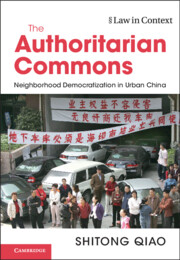Book contents
- The Authoritarian Commons
- Law in Context
- The Authoritarian Commons
- Copyright page
- Dedication
- Contents
- Figures
- Tables
- Acknowledgments
- Abbreviations
- Introduction
- Part I Theory
- Part II A Tale of Three Cities
- Part III Benefits and Risks
- Conclusion
- Appendix I: Summary of Research Methods
- Appendix II: Survey Data and Analysis
- Notes
- Bibliography
- Index
Introduction
Published online by Cambridge University Press: 21 December 2024
- The Authoritarian Commons
- Law in Context
- The Authoritarian Commons
- Copyright page
- Dedication
- Contents
- Figures
- Tables
- Acknowledgments
- Abbreviations
- Introduction
- Part I Theory
- Part II A Tale of Three Cities
- Part III Benefits and Risks
- Conclusion
- Appendix I: Summary of Research Methods
- Appendix II: Survey Data and Analysis
- Notes
- Bibliography
- Index
Summary
Homeowner self-governance constitutes a form of basic democracy, which means collective self-government without committing to conventional liberal values, and poses a tricky dilemma for the party-state. On the one hand, it can relieve the party-state of the burden of trying to govern hundreds of thousands of complex neighborhood problems that, if badly handled, could undermine the party’s legitimacy simply through incompetence. On the other hand, independent civic organizations may threaten the party leadership both within and beyond residential neighborhoods.
- Type
- Chapter
- Information
- The Authoritarian CommonsNeighborhood Democratization in Urban China, pp. 1 - 4Publisher: Cambridge University PressPrint publication year: 2025

